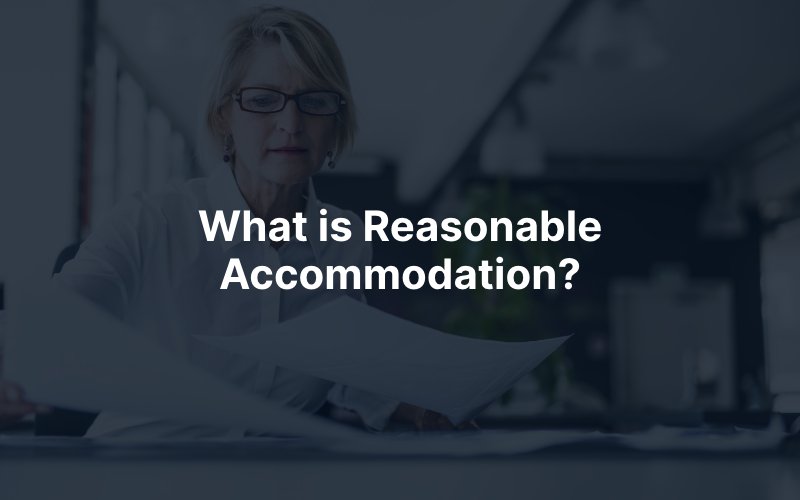Reasonable accommodation refers to modifications or adjustments to a job or work environment that enable individuals with disabilities to perform their job duties or enjoy the benefits and privileges of employment.
If you are an individual with disability and believe you have not received reasonable accommodation to perform your job duties, contact our Orange County disability discrimination attorneys today. Call us at (949) 379-6250 today.

Reasonable accommodation can take many forms, depending on the employee’s needs and the nature of their job. Common types include:
If you have been retaliated against for taking medical leave, contact our medical leave retaliation attorney in Orange County to discuss your legal options today.
Reassigning an employee to a vacant position for which they are qualified, if they can no longer perform their current job due to a disability.
The primary law governing reasonable accommodation is the Americans with Disabilities Act (ADA). The ADA prohibits discrimination against individuals with disabilities in all areas of public life, including employment. Title I of the ADA specifically addresses employment and requires employers with 15 or more employees to provide reasonable accommodations to qualified individuals with disabilities, unless doing so would cause undue hardship to the employer.
California’s Fair Employment and Housing Act (FEHA) offers even broader protections than the ADA. FEHA applies to employers with five or more employees and mandates reasonable accommodations for employees with disabilities. It also includes protections for employees with conditions related to pregnancy and childbirth.
Under both the ADA and FEHA, a disability is defined as a physical or mental impairment that substantially limits one or more major life activities. This can include conditions such as mobility impairments, visual or hearing impairments, chronic illnesses, mental health disorders, and more. Temporary conditions that are severe enough to substantially limit major life activities can also be considered disabilities under these laws.
Employers have specific obligations when it comes to providing reasonable accommodations. These responsibilities include:
The ADA and FEHA require employers to engage in a good-faith interactive process with employees who request accommodations. This involves open communication to understand the employee’s needs and explore possible accommodations.
Employers must assess accommodation requests on a case-by-case basis. This includes evaluating the nature of the disability, the employee’s job functions, and the potential accommodations.
Once an appropriate accommodation is identified, employers must implement it in a timely manner. Unnecessary delays can be considered a form of discrimination.
Employers must keep all information related to an employee’s disability and accommodation request confidential, and should only be shared with individuals who need to know.
It is against the law for employers to retaliate against employees who request or utilize reasonable accommodations. Retaliation can include adverse actions such as demotion, termination, or harassment.
While employers are required to provide reasonable accommodations, they are not required to do so if it would cause undue hardship. Undue hardship refers to significant difficulty or expense relative to the size, resources, and nature of the employer’s business. Factors considered in determining undue hardship include:
Employers must thoroughly document their analysis and reasoning if they determine that an accommodation would cause undue hardship.
Identify specific challenges you face and consider potential accommodations that could help you overcome these challenges.
Speak with your healthcare provider about your condition and ask for recommendations on accommodations that may be beneficial.
Submit your accommodation request in writing to your employer, detailing your disability and the specific accommodations you need. Providing medical documentation can help substantiate your reasoning.
Communicate openly with your employer about your needs.
Be open to exploring different accommodations that can meet your needs. Sometimes, alternative solutions may be just as effective.
If you encounter resistance or denial of your accommodation request, you have several options to address and potentially overturn it.
Immediately ask for a written explanation from your employer detailing the reasons for the denial. Understanding their rationale can provide insight into potential misunderstandings or areas that need further discussion.
Keep detailed records of all communications with your employer, including emails, meeting notes, written explanations, and any additional documentation you provide.
Consider speaking to an Orange County disability discrimination attorney. They can give you guidance on your legal options, evaluate the strength of your case, help you file a claim, and advocate for your rights.
Before suing, you must file a complaint with California’s Civil Rights Department, which is a state agency that enforces California’s civil rights laws, including FEHA. Alternatively, you can file a charge with the U.S. Equal Employment Opportunity Commission, which enforces the ADA. Either agency can investigate your complaint and potentially mediate a resolution. Your attorney will advise you on which agency to file a claim with based on your situation.
If necessary, an attorney can represent you in negotiations or mediation. They can advocate on your behalf to ensure your rights are protected and that you receive the accommodations you need. In addition, you may receive compensation for lost wages and damages for any discrimination or retaliation you experienced if applicable.
If you obtain a right to sue from the CRD or EEOC, your Disability Discrimination Attorney will help you file a lawsuit in the appropriate court. They will handle all legal proceedings, including drafting legal documents, gathering evidence, and representing you.